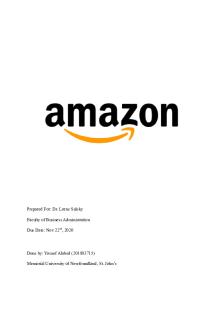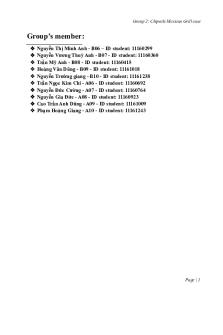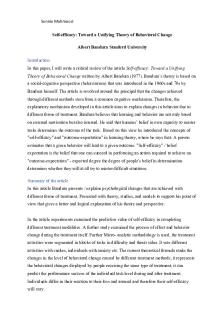ACCG224 Individual Assignment Sem2 2019 PDF

| Title | ACCG224 Individual Assignment Sem2 2019 |
|---|---|
| Author | Dilan Sesen |
| Course | Intermediate Financial Accounting |
| Institution | Macquarie University |
| Pages | 9 |
| File Size | 245 KB |
| File Type | |
| Total Downloads | 8 |
| Total Views | 229 |
Summary
ACCG224 Individual Assignment Sem2 2019 - 46/60 mark...
Description
WOOLWORTHS GROUP LTD An Assessment of the choices relating to accounting estimates and policies on property, plant and equipment (PPE). Dilan Sesen September 1, 2019
Word Count: 1296
Contents ACCG224 S2 2019
45405972
1
Executive Summary............................................................................................... 3 Introduction......................................................................................................... 4 Body.................................................................................................................. 4 Selecting an Accounting Policy.............................................................................. 4 Changing an Accounting Policy.............................................................................. 5 Impact of Professional Judgement........................................................................... 5 Woolworths PPE Accounting policies and estimates.....................................................6 Recommendations.............................................................................................. 8 Conclusion.......................................................................................................... 8 Reference List...................................................................................................... 9 Appendix............................................................................................................ 9
ACCG224 S2 2019
45405972
2
Executive Summary This report provides an analysis and evaluation of the choices made by Woolworths Group Ltd concerning their accounting policies and estimates used to measure property, plant and equipment. The process of selecting and changing an accounting policy is explained first in relation to AASB 108. When selecting a policy management must refer to both AASB standards that deal with related issues and the measurement concepts, recognition criteria and definitions found in the conceptual framework. When changing an accounting policy management must meet one of the criteria contained in AASB 108 paragraph 14; if the change is compulsory because of an AASB standard; or if the change would result in the entities financial statements providing more reliable and relevant information. The accounting policies and estimates used by the Groups management to measure PPE are the depreciation method used and the useful life of an asset. The depreciation method used for the assets is straight line over the useful life of the assets, down to their residual value. Subsequently, the useful life of an asset is determined using significant management judgement and is reviewed at least annually. The Group's accounting policies and estimates were critically analysed and compared to competitors and industry norms. It was found that the Groups building, plant and equipment’s estimation of useful life as well as depreciation method were all very normal within the industry standards. Where the Group slightly differed is its leasehold improvements where they specify the difference between retail properties and hotels. It was found that this is because the Group, in comparison to other competitors in the industry, has many hotel subsidiaries. In particular, they have 75% ownership of ALH Group. The current accounting policies and estimates the Groups management have put in place are both relevant and reliable; thus no recommendations were made to change or alter them.
ACCG224 S2 2019
45405972
3
Introduction Corporate financial statements are largely dependent on the judgement calls of the employees creating them. Moreover, even when these estimations are made in good faith, they aren’t always relevant or reliable. The process of deciding the most appropriate estimation is extremely challenging and often involves more than one correct answer. The policies that are involved in making decisions utilising only professional judgement, as well as how to select and change them, are all laid out in the Australian Accounting Standards Board (AASB). Woolworths Group Ltd has its own accounting policies and estimates that they use to measure their property, plant and equipment. These policies and estimates need to be compared to their competitors and to industry norms to discover whether they are appropriate.
Body Selecting an Accounting Policy According to AASB 108 paragraph 7, when a transaction, other event or condition has an Australian Accounting Standard specifically apply to it, then the accounting policies that are also applied to the item are determined by the said standard. The AASB has concluded that these policies must result in financial statements containing both reliable and relevant information about the items to which they apply. AASB108 paragraph 10 concludes that when there is an absence of an Australian Accounting Standard that specifically applies to an item then management is relied upon to use its professional judgement in developing and applying an accounting policy that is both relevant and reliable. They must refer to the Australian Accounting Standards requirements that are dealing with similar and related issues, and the recognition criteria, definitions and measurement concepts in the Conceptual Framework.
ACCG224 S2 2019
45405972
4
Changing an Accounting Policy When an entity is looking to change their accounting policies, unless an Australian Accounting Standard specifically requires or permits the categorisation of items that may be appropriate to have different policies in place, they must apply their accounting policies consistently for items that are similar in nature. An entity is only allowed to change its accounting policies if it meets one of the criteria in paragraph 14 of AASB 108; if the change is required by an Australian Accounting Standard; or if the change results in the entities financial statements providing a more relevant and reliable source of information about the effects of the items on the entity’s financial performance, financial position or cash flows.
Impact of Professional Judgement The reliability and relevance of policies and estimates relies heavily upon the professional judgement of the accountant creating them. Estimates need to be consistent throughout the financial reports, two different people’s estimates can result in very different accounting information. Proper decision-making process have reliable and objective accounting information as a prerequisite (Sacer, Malis & Pavic, 2016, pp. 399), and when they fail to meet these prerequisites the impact on the dependability of the entity’s financial statement is critical. When estimates are made it implies a certain amount of subjectivity, the AASB admits that “to a large extent, financial reports are based on estimates, judgements and models rather than being exact depictions'' (AASB, 2014).
ACCG224 S2 2019
45405972
5
Woolworths PPE Accounting policies and estimates There are many different accounting policies and estimates that are used to measure PPE. Within Woolworths Group Ltd the policies used that are relevant to PPE are the depreciation of its assets and the estimations that are pertinent to the useful life of assets. A significant accounting policy is the process in which the Group calculates the depreciation of its assets. The Group has chosen to utilise the straight-line method for the depreciation of their assets, they are depreciated over the useful lives, down to their residual value (Woolworths Group Ltd, 2019). Straight-line depreciation is the most simple yet most widespread form of depreciation used by companies. It is straightforward, uncomplicated, and is most suitable for those assets, such as PPE, that can have their useful life estimated accurately. The Group also specifies the amortisation of leasehold improvements as being over the improvements useful life (Woolworths Group Ltd, 2019). Subsequently, the useful life of an asset is a critical accounting estimate for the Group. Significant management judgement is required when estimating the remaining useful life of a PPE asset and is reviewed at least annually. This estimate is echoed in AASB 116 paragraph 57 where it states that the estimation of an assets useful life is a matter of judgement based on the entities experience with similar assets. When the parts of an item of PPE have different useful lives then they are accounted for separately as different assets, this is also reaffirmed in AASB 116 paragraph 43. This is likewise shown in the following table from the Groups 2019 annual report whereby it can be seen that the useful life of leasehold improvements has been accounted for differently.
ACCG224 S2 2019
45405972
6
Analysis of Accounting Policies and Estimates The skills and knowledge of management of the Group is a key factor in determining whether the aforementioned policies and estimates are reasonable. In trying to determine whether the professional judgement applied was appropriate we will look at the norms in the industry by comparing the Group to both its competitors and thus the norms within the industry. Firstly, Coles Group Ltd also applies significant management judgment when determining its assets useful life (Coles Group Ltd, 2019) and as a result, the length of their PPE assets useful life is somewhat varied from what the Groups is. The building, plant and equipment’s useful lives are very similar regarding both entities, but the leasehold improvements are not. Coles states that their improvements useful life is simply the terms of the lease (Coles Group Ltd, 2019), this is a very broad and open statement that allows for more specific data on each PPE asset. The Group, on the other hand, specifies that it is up to 25 years for retail properties and up to 40 years for hotels (Woolworths Group Ltd, 2019). The difference between the entities comes about from the Groups larger portfolio of hotels. While Coles does own the Talbot Hotel Group it is much smaller in comparison to the Groups 75% ownership of the ALH Group. By specifying the terms of the improvements of retail and hotel differently the Group can appropriately estimate a more accurate useful life for its two main sources of improvements. The specifying of hotels and retail stores in the Group’s annual report affirms the skills and knowledge the management possessed when they made the professional judgements. In a similar vein, if we look at Costco Wholesale Corporations 2019 annual report, they also have similar useful lives for their building and equipment. Their leasehold improvements are estimated to have a useful life of five to fifty years (Costco Wholesale Corporation, 2018). Furthermore, akin to both the Group and Coles, Costco has given specific parameters for their assets useful life but hasn’t differentiated between their kinds of assets. When looking at these findings it is clear to see that the Group is not deviating from industry norms and is, in turn, applying its professional judgement to its policies and estimates in a reasonable way.
ACCG224 S2 2019
45405972
7
Recommendations The Group has stayed within the industry norms while also individualising their policies and estimations by specifying their major assets within their report. The policies and estimates that they have been utilising to measure their PPE are both relevant and reliable, because of this no recommendations concerning PPE have been made.
Conclusion To summarise, professional judgement is critical in determining entities accounting policies and estimates. The process of deciding the most reasonable policy or estimation is extremely difficult and the parameters on how to select and change them are all laid out in AASB 108. By keeping in line with the AASB, Woolworths Group Ltd has utilised significant management judgement in deciding their own policies and estimates to measure their PPE assets while staying consistent with the norms of the industry.
ACCG224 S2 2019
45405972
8
Reference List Australian Accounting Standards Board 2016, Framework for the Preparation and Presentation of Financial Statements, pp. 31, viewed 23 September 2019 Coles Group Ltd. (2019) Annual Report 2019. Available at: https://www.colesgroup.com.au/FormBuilder/_Resource/_module/ir5sKeTxxEOndzdh00 hWJw/file/Coles_Annual_Report_2019.pdf Costco Wholesale Corporation. (2018) Annual Report 2018. Available at: http://www.annualreports.com/HostedData/AnnualReports/PDF/NASDAQ_COST_2018. pdf Sacer, I M Malis, S S Pavic, I 2016, ‘The impact of accounting estimates on financial position and business performance – case of non-current intangible and tangible assets’, Procedia Economics and Finance, Vol. 39, pp. 399-411, viewed 23 September 2019, ScienceDirect database Woolworths Group Ltd. (2019) Annual Report 2019. Available at: https://www.woolworthsgroup.com.au/icms_docs/195582_annual-report-2019.pdf
Appendix
ACCG224 S2 2019
45405972
9...
Similar Free PDFs

Individual Assignment
- 26 Pages

Individual Assignment
- 20 Pages

Individual assignment
- 5 Pages

Individual assignment
- 3 Pages

Uo S Outline FINC2011 SEM2 2019
- 6 Pages

TK3163 Sem2 2018 2019 Quiz 1
- 1 Pages

Uo S Outline ACCT2011 SEM2 2019
- 7 Pages

Individual Design - FSE100 2019
- 2 Pages

ACCG224 Work uni
- 10 Pages

MGT 162 INDIVIDUAL ASSIGNMENT
- 24 Pages
Popular Institutions
- Tinajero National High School - Annex
- Politeknik Caltex Riau
- Yokohama City University
- SGT University
- University of Al-Qadisiyah
- Divine Word College of Vigan
- Techniek College Rotterdam
- Universidade de Santiago
- Universiti Teknologi MARA Cawangan Johor Kampus Pasir Gudang
- Poltekkes Kemenkes Yogyakarta
- Baguio City National High School
- Colegio san marcos
- preparatoria uno
- Centro de Bachillerato Tecnológico Industrial y de Servicios No. 107
- Dalian Maritime University
- Quang Trung Secondary School
- Colegio Tecnológico en Informática
- Corporación Regional de Educación Superior
- Grupo CEDVA
- Dar Al Uloom University
- Centro de Estudios Preuniversitarios de la Universidad Nacional de Ingeniería
- 上智大学
- Aakash International School, Nuna Majara
- San Felipe Neri Catholic School
- Kang Chiao International School - New Taipei City
- Misamis Occidental National High School
- Institución Educativa Escuela Normal Juan Ladrilleros
- Kolehiyo ng Pantukan
- Batanes State College
- Instituto Continental
- Sekolah Menengah Kejuruan Kesehatan Kaltara (Tarakan)
- Colegio de La Inmaculada Concepcion - Cebu





